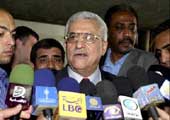|
Settlements On Palestinian Land ‘Internal’ Affair: Sharon
 |
|
“Many leaders across the world have protested to me about the outposts,” Sharon
|
OCCUPIED
JERUSALEM, July 22 (IslamOnline.net & News Agencies) - In another
blow to the U.S.-backed “roadmap” peace plan, Israeli Prime
Minister Ariel Sharon said late Monday, July 21, that Jewish
settlement outposts are an "internal" matter which the
Jewish state will deal with at its discretion, rather than under
international pressure.
Speaking
before the Knesset, Sharon stressed that the fate of
"authorized" Jewish settlements would not be on the
negotiating table until final status talks between Israel and the
Palestinians.
"The
future of Jewish settlement in Judea and Samaria (the West Bank) and
the Gaza Strip will be debated only when we get to final status
negotiations," Sharon said.
"We
have no intention of doing it now. It is not in Israel's interest to
do it now," he said."
As
for what he called “unauthorized outposts”, Sharon said Israel, as
a law abiding country, will have the proper authorities to deal with
it, according to its ability and at its discretion."
“Many
leaders across the world, even our best friends, have protested to me
about the outposts,” he explained to the Israeli parliament.
Following
Sharon's five-minute address, frequently interrupted by shouting,
parliament voted by 47 votes to 27, with a single abstention, to
endorse his policy statement on settlements, Agence France-Presse
(AFP) reported.
Dealing
with the rogue outposts was an "internal Israeli issue"
which Israel would handle in its own time, Sharon stressed.
He
had sharp words for any effort to equate the issue of outposts with
"legitimate" settlement activity.
"Those
among us, on both the left and the right, who link the issue of
unauthorized settlement activity to (legal) settlement, are making a
serious mistake and playing into the hands of our enemies," he
warned.
Sharon
has long been a champion of Israel's settlement policy, although the
international community regards Jewish settlements built on occupied
territory as illegal
His
statements came as another block on the way to the implementation of
the “roadmap”, which calls on Israel to dismantle immediately
settler outposts set up since Sharon took office in March 2001 and to
freeze all settlement activity.
Only
a handful of the hilltop settlements, usually only a few temporary
structures, have been dismantled since the U.S.-led Aqaba summit and
peace groups say those removed have already been replaced, Reuters
said.
His
parliament speech drew anger among Palestinian and Arab officials,
especially after Palestinian factions declared a temporary ceasefire
in hope for reciprocal steps by Israel and for the “roadmap” to be
set into motion.
“This
is unacceptable because it is not in line with Israel's obligation
under the road map that says Israel should dismantle the rogue
outposts and stop construction in existing ones," Khatib
Palestinian Labor Minister Ghassan al-Khatib said.
Saudi
Foreign Minister Prince Saud Al-Faysal described the Knesset’s
approval as “absurd”.
“It
is an absurd and intentioned decision as it came at a more absurd time
and taken by a batch of extremists in the Israeli parliament,”
Prince Saud said.
Fence
Construction
 |
|
"We want the release of all the detainees no matter what," Abbas
|
Sharon
also urged MPs in his Likud party to vote in favor of extra funding
for the construction of the fence separating Israel from the West
Bank, public radio reported.
The
fence loosely follows the 1967 Green Line division between Israel and
the West Bank, but it dips deep into occupied Palestinian territory at
several points in order to protect settlements.
It
also leaves several Palestinian villages cut off from the rest of the
West Bank.
The
Palestinians accuse Israel of using the fence to unilaterally
determine the borders of a future Palestinian state and of wanting to
ethnically cleanse the West Bank with a de facto annexation of its
most fertile regions.
During
a visit to the region in late June, US national security adviser
Condoleezza Rice admitted the fence was "problematic"
because it would "create a fait accompli" but Sharon had
denied the fence was politically motivated.
Construction
of the fence was launched in June 2002. It is expected to cut annexed
east of occupied Jerusalem off from the rest of the West Bank and a
first 145-kilometre (90-mile) section is due for completion in July.
‘Peace
to Prevail’
In
the meanwhile, Palestinian Prime Minister, now in Cairo as part
of a shuttle of diplomacy that will take him to Jordan and the
United States, warned that with Israel’s refusal to release more
prisoners, withdraw more troops and scrap (Jewish) settlements,
“achieving stability will be difficult."
"That's
why if the Israeli government wants peace to prevail, it has to tackle
all those issues, and to respect the roadmap which involves all those
issues -- whether prisoners, settlements, withdrawals ..."
Abbas
refused to budge on the release of prisoners.
"We
want the release of all the detainees no matter what their
affiliations are or their geographic regions," he said.
"What's
important for us is the truce that we agreed with Palestinian factions
and that everybody respects it," he said after meeting Egyptian
President Hosni Mubarak ahead of his first visit to the White House.
In
a meeting Sunday, Abbas and Israeli Prime Minister Ariel Sharon clashed
over the issue of detainees and Palestinian leader Yasser Arafat's
long confinement to his headquarters in Ramallah.
Israel
has said it would only release some 300 Palestinian detainees,
provoking ire of Palestinians who wanted all of their estimated 6,000
detainees be released.
Israel
must free all Palestinian detainees from its jails if it wants
"peace to prevail", Abbas said in Cairo.
But
Sharon's government has so far approved the release of just 350
detainees, none of whom are members of the groups Hamas and Islamic
Jihad whose ongoing truce is conditional on the release of all
detainees.
|